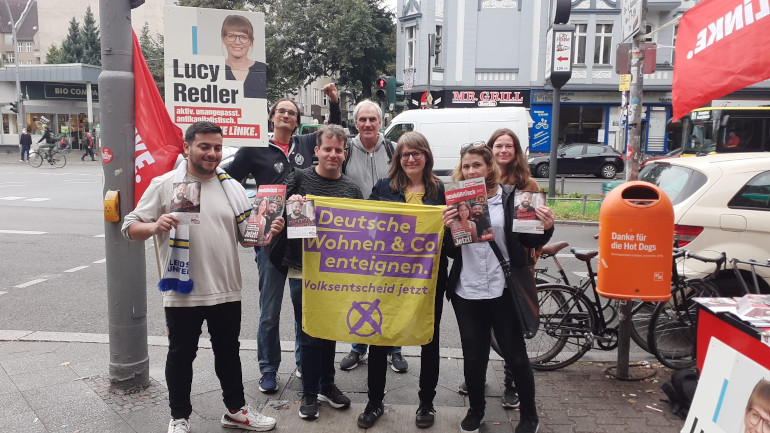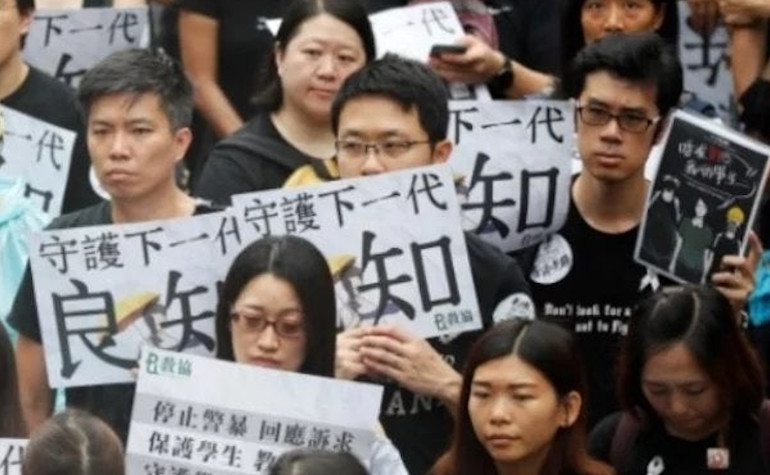Lucy Redler is a member of Sozialistische Alternative (ISA in Germany).
Lucy Redler ran for office as a direct candidate for the Left Party in the Neukölln electoral district of Berlin. She is a member of the Left Party, the Anticapitalist Left movement within the Left Party (Antikapitalistische Linke or AKL in German), and the SAV.
The Berlin election night’s most exciting result was not whether the Social Democratic Party’s (SPD) Franziska Giffey or the Green Party’s Bettina Jarrasch would become the mayor of Berlin, but whether the referendum “Deutsche Wohnen & Co enteignen” (Expropriate Deutsche Wohnen & Co) would receive majority support. The most important campaign in years enjoyed a landslide victory receiving 56.4 percent of the vote! 10 out of 12 of Berlin’s districts voted for the referendum. All future Berlin governments will be under immense pressure from this campaign and the tenants’ movement.
While the federal election campaign meandered on with empty slogans and debates, the elections in Berlin were characterized by the campaign to socialize housing (Expropriate DW) and the strikes by the healthcare workers’ movement at the Charité and Vivantes hospitals. Rarely have two pivotal campaigns put top-ranking politicians running for office under such pressure to show their true colors as Expropriate Deutsche Wohnen & Co and the Berlin healthcare workers’ movement have.
These campaigns were born of the convulsions into which the global capitalist system has sent our societies. The global crisis in affordable housing caused by massive companies buying up large amounts of property to use as investment objects has not left Berlin unscathed. In a city once known for cheap and available housing in the aftermath of the fall of the German Democratic Republic, the average rent prices have begun to approach levels more appropriate for London or New York. Wages for many residents of the city have of course not closed this gap and countless people have been driven from their homes. In more high-profile cases of evictions such as the eviction of the queer anarcho-feminist squat, Liebigstraße 34, thousands of police have been called in and entire city blocks fenced off. Amidst all this capitalism induced chaos, a group of grass roots activists formed around a demand to strip the massive companies responsible for the mayhem of their ill begotten real-estate portfolios.
One of the most egregious perpetrators is the real-estate company Deutsche Wohnen, translated literally German Living. This company was notorious for unethical behavior and naked greed. Hence the reason why the initiators of the campaign selected it as their namesake. It is only one of several large companies, however, that have consistently put its bottom line over the economic well-being of the city’s residents. The initiators of the campaign reflected this fact by naming it Deutsche Wohnen & Co Enteignen, which translates to Expropriate Deutsche Wohnen & Co. Given that Germany is a firmly capitalist country, expropriation might seem like an impossible legal task. But the activists behind the campaign have taken a great many things into consideration.
Article 15 of the German Basic Law potentially provides the legal means to carry out the campaign’s demands. This article states that “Land, natural resources and means of production may, for the purpose of nationalisation, be transferred to public ownership or other forms of public enterprise by a law that determines the nature and extent of compensation. With respect to such compensation the third and fourth sentences of paragraph (3) of Article 14 shall apply, mutatis mutandis.”. On this basis the campaign leaders are certain that a legal case for expropriation can succeed. This is certainly what has driven them since the campaign’s founding two years ago.
Since then, the campaign has grown at a steady pace and become increasingly sophisticated. It has grown to a network of around 2,000 activists with local sections in all of Berlin’s neighborhoods. It was able to gather over 350,000 signatures between January and June of 2021 despite the added difficulty of the pandemic. The campaign also has a highly active and quality social media presence, alongside its own app to easily find activities to participate in and a team of translators working to bring the campaign’s messages to non-German speaking residents. The campaign was also given a boost after the Berlin Senate’s rent cap was overturned by the German Supreme Court on a technicality. The day the judgement was announced about 20,000 people marched through the neighborhoods of Neukölln and Kreuzberg to demonstrate their anger. With this backdrop and the looming elections, the DWE teams put all their energy into the campaign and succeeded not only in gathering enough signatures to get on the ballot, but to win at the polls as well. Now the next, and likely most arduous, phase of the campaign will begin.
The fight to implement the decision begins
The DW campaign’s success was eked out by thousands of activists and must now be pushed through against the real-estate lobby and its friends the Christian Democratic Union (Center-right), the Alternative for Germany (AfD, far-right), the Free Democratic Party (Classic-liberal), the Social Democratic Party (Center-left), and the Green Party. Franziska Giffey, the newly designated governing mayor, had already stated prior to the election that she would not even consider implementing the referendum. The Greens would also prefer to have a round-table discussion with the real-estate companies and kindly ask them to be nicer to their tenants. They will attempt to prevent expropriation by legal and political means. A wide-ranging strategic discussion on the campaign’s next steps, including a conference on urban policy, the next dates for demonstrations, “visitations” with the ruling parties, is now required.
Continue supporting the Berlin healthcare workers’ movement
The Left Party and the labor union movement are obligated to increase their efforts and to continue to put their full support behind the striking workers at the Charité and Vivantes hospitals. Thus far it has been impossible to reach a settlement on workers’ demands to extend the German Collective Wage Agreement for Public Sector Employees (Tarifvertrag für den öffentlichen Dienst or TVöD in German) to all employees in the hospitals and to develop a relief plan for chronically understaffed and underfunded hospitals. This will not become easier after the election and instead will become more difficult over time. The first appointment for the newly elected representatives of the Left Party should not be exploratory meetings with the SPD and the Greens, but a visit to the striking workers.
Berlin Election Results
The best result from the elections for Berlin’s House of Deputies was the far-right AfD’s loss. Their share of the vote decreased from 14 percent of the votes in 2016 to 8 percent in the last election. 8 percent is still too much, but a success for the antifascist movement, nonetheless. Otherwise very little has changed. The Greens gained an additional 3.7 percentage points, various smaller parties once again increased their share of the vote, altogether totalling over 12 percent. The Left Party again lost votes while sitting in the government (a decrease of 1.6 percent), for the CDU and SPD there was virtually no change in their percentage of the vote share. The mobilizing effect of the referendum is one factor that can be attributed to the increase in voter participation from 67 to 76 percent.
Sobering Result for the Left Party
The incredible success of the referendum did not equal success at the ballot box for the Left Party, which was the only party to support the referendum clearly and openly. There are many reasons for this. One reason is that the Left Party is not utilizing its maximum potential as it avoids attacking the SPD and the Greens due to its desire to participate in a coalition government. The Left Party had the perfect setup when the SPD’s Franziska Giffey declared that she would not implement the referendum! It should have called the continuation of the coalition into question by declaring: “If the SPD’s top-ranking politician announces that she will not implement the will of one million people, then we say: Not with us!” Instead, leaders in the Left Party claimed that Giffey’s statements were simply electioneering bluster.
A similar escalation was (and is) possible with the healthcare workers’ strikes. It is excellent that many of the Left Party’s candidates were present at the strikes. The truth is that Berlin could provide sufficient funds for the city-owned hospitals: the SPD has two members on the supervisory board at Vivantes Hospital and could meet the strikers’ demands with a shareholders’ resolution. If the Left Party will not point out that the SPD plasters posters with popular social demands across the city while simultaneously preventing wage increases for employees at Vivantes’ subsidiary companies, then who will?
If the Left Party does not sufficiently set itself apart from the SPD and the Greens, it is no wonder then that many voters in Berlin sympathetic to it tactically voted for the Greens this time to prevent Franziska Giffey from winning the mayor’s office.
Another reason is the continued downward trend for the Left Party in Berlin’s eastern neighborhoods: in the neighborhoods of Marzahn-Hellersdorf, Lichtenberg and Treptow-Köpenick the Left Party lost huge amounts of votes. In Germany’s Parliamentary elections, each voter receives two votes known as the first and second vote. The first vote directly elects certain candidates from the voter’s constituency who may or may not belong to a particular party, they are known as direct candidates. The second vote goes to a party and the number of seats in the local and federal parliaments are then decided according to a personalized proportional representation system. More information on this system can be found here. In Berlin’s local elections the Left Party won the greatest amount of second votes in the district with its most militant local organizing group: in Neukölln.
Anticapitalist Election Campaign in Neukölln
With hundreds of active volunteers and a clear orientation towards grassroots movements and anticapitalism, the Left Party reversed the trend in both Berlin and on a federal level by increasing its share of first votes by 2.7 percent and second votes by 0.8 percent throughout Neukölln. For the first time the Left Party in Neukölln was above the Party average compared to the whole of Berlin. Though the Left Party’s candidate in the second electoral district — Jorinde Schulz — did not win the seat, she received 30 percent of the vote share, which was the highest amount of first votes out of all the Left Party candidates in Berlin. The author of this article ran a campaign based on anti-capitalist principles and opposition to the SPD, the Greens and other establishment parties and was also able to achieve outstanding results. Despite not winning the seat, she received 26.6 percent of the first votes (an increase of 7.4 percent from the last election) and the fourth best result for the Left Party in Berlin. Similar success was achieved in northern Neukölln’s third electoral district.
It is constantly claimed that the electorate only votes for Left Party if it clearly supports the Red-Red-Green coalition, the ruling coalition of the SPD, Green Party, and Left Party. If we look at Neukölln this statement does not apply. Here the party was able to inspire and mobilize its members with a militant election campaign. Something which the Left Party was unable to do on a broad scale in the federal elections.
It is now imperative to build on the successes in Neukölln, to recruit new members and to support the movement to expropriate real-estate companies as well as the Berlin healthcare workers’ movement with renewed vigor. This will prepare us to bring socialist policies from Neukölln right into Berlin’s House of Deputies in the next elections in five years.




